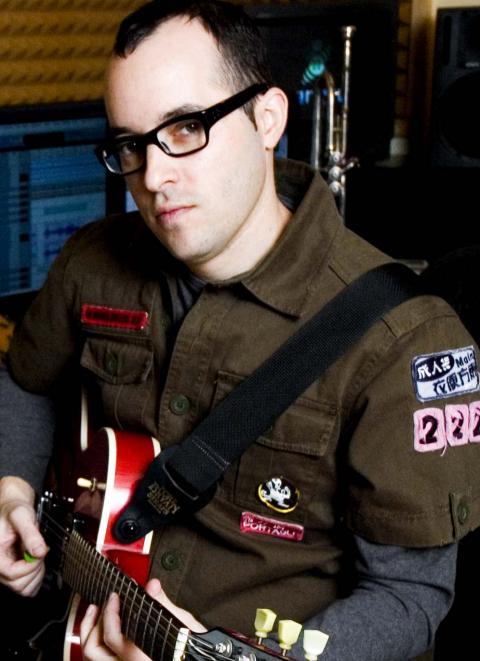Alumni Profile: Paul Goldman '93

Paul Goldman '93
Sasha Nialla
While he was growing up in the suburbs north of Chicago in the 1980s, Paul Goldman’s preference for music was Metallica, Yngwie Malmsteen, and other hard rock artists with an emphasis on guitar shredding. These days, his palette is considerably broader. The music he writes fits as comfortably on MTV as it does behind major corporate ad campaigns—some issuing from Madison Avenue, just blocks from his office.
In the 13 years since he graduated from Berklee with a degree in film scoring, Goldman has established two companies that produce music and motion graphics for network television clients (like MTV) and commercials for such corporate clients as Sprite, McDonald’s, Verizon, and many more. Ear Goo, Inc. is the entity that creates the music, Elements produces the motion graphics, including those that flashed across millions of TV screens during Superbowl XL.
Goldman’s aptitude for both music and technology is a huge factor in his success, but his forward-looking business strategy and willingness to take calculated risks have brought him to where he is now. He is currently outfitting his studios to work in 5.1 surround sound and high-definition (HD) television.
“It takes some investment to get into 5.1 and time to learn it,” says Goldman. “We are hoping to brand ourselves with three-dimensional sound. I need a new board, speakers, surround-sound reverbs, software plug-ins, and bass management stuff. The HD decks start at $100,000, but I believe 5.1 is the future of music audio.”
Goldman has built a solid reputation for writing music that is as appealing as it is expansive in its scope, which ranges from urban contemporary to jazz and ethnic sounds. “I’m lucky that I like all kinds of music,” Goldman says. “I don’t care if it’s a hip-hop album or a jazz or classical album. I find it really hard to dislike a particular type of music.” Having a deep well to draw from has been Goldman’s salvation when a client asks him to produce five or six different demos for a commercial.
Goldman set out to launch his career in New York the summer after his graduation from Berklee. He had friends doing internships there and was eager to get started. “After I walked through graduation, I hitched a ride to New York with a friend who was going to New Jersey,” Goldman says. “I started by opening up the Manhattan yellow pages and sending out 100 resumes to composers listed there.”
Goldman ultimately took an unpaid internship with a composer who wrote music for National Geographic and other television shows. At the end of the summer, he was hired by another composer for $200 a week and got opportunities to compose and learn all aspects of the business.
“That was a cool era in the music industry,” Goldman says. “There were lots of established composers who had bought the new computer and audio gear, but most didn’t know how to even turn it on. So a young person who knew about technology was invaluable to these guys. Those who didn’t want to learn the technology made a big mistake because they’re no longer in the business. My peers saw technology as the key to where things were going.”
Goldman set up his own home studio in a one-bedroom apartment and began looking for work. “I began by doing student projects for film majors at Columbia and New York University,” he says. “I earned a few hundred dollars composing for their projects and learned about editing, mixing, and sound design.” Some of the up-and-coming directors he met are very successful today and still call Goldman for their music.
In his small studio, Goldman worked on films and commercials and even the 1999 MTV video awards. All the while he lived frugally and saved enough cash to build a bigger facility in 2000. Today, Goldman’s business has a long roster of steady clients and he successfully pitches his company’s services for national ad campaigns.
“MTV is one of our clients,” says Goldman. “We do five spots with original music per week for them—that’s 70 percent of their work. We’ve done their video awards shows for six years, and this week we are working on the packaging for their new HD channel. We’re doing ringtones and wallpaper [picture graphics] for Verizon, and we license a wallpaper catalog. Elements’ clients include the NBA, CNBC, and the on-demand channel.”
Goldman’s goal is to deliver finished projects with a smile and on time. “We are generally given from eight hours to two days to complete a project,” he says. “Our clients can come in with a 30-second commercial, and we’ll have the voice-over, sound design, and original music completed and mixed within eight hours. I learned in my first internship that it’s better to meet the deadline than miss it even if you feel you could have improved things by taking a little more time. You won’t get called back if you’re late, and the client probably won’t notice the small touches you added by going overtime.”
In his studio, Goldman has a slew of awards—including several Broadcast Design Awards, a Clio, and an Addy—but says he doesn’t think about awards much. His heart is in writing the music. “I enjoy talking to the director, getting the rough cut, discussing concepts, and developing and pitching a budget,” he says. “But once all that is finalized, I consider the hard work done. Then I can just close the door and get down to writing some music.”




